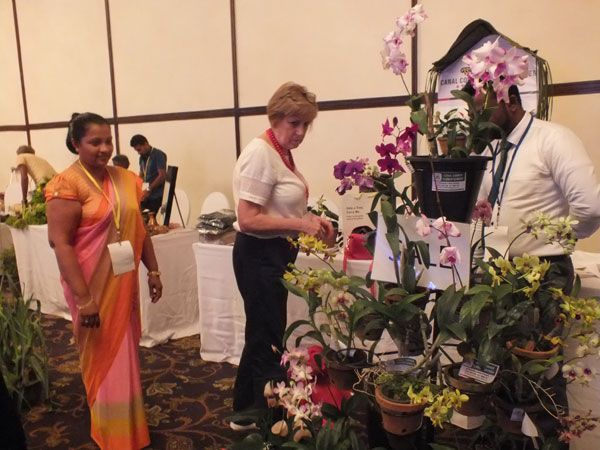Human-elephant conflict: Kenyans use bees to drive away elephants
In Kenya, which is grappling with the human-elephant conflict just like Sri Lanka, bees and their humming, setting up bee hives and even placing bees humming recordings in vantage points are used to scare off elephants. The hives are connected to each other with strings and when the elephant penetrates the strings, the bees get disturbed and start stinging and attacking the elephants which is a method which has been proved successful. Bees’ honey, in the meantime is collected, branded and sold locally and globally.

An exhibitor (left) promoting the sale of flower pots
These details emerged during a discussion at the second International Conference on ‘Social Enterprise and Social Finance’ held on Monday at Water’s Edge resort, Battaramulla. Earlier Dr. Indrajit Coomaraswamy, Governor, Central Bank (CB), who made the keynote address, said that in developing social enterprises, a concerted and holistic intervention should be made to improve the areas of training, access to technology, financing and marketing and among them all – the most important area is marketing.
The conference was organised by Lanka Social Ventures (LSV) in partnership with the British Council and United Nations Economic and Social Commission for Asia and the Pacific (ESCAP). To achieve inclusive growth, he stressed that all stakeholders should strive in finding markets to help the economic ecosystem of enhanced productivity. If the marketing channels are opened up the other areas would be fulfilled, he indicated.
He said that while focusing on the current trends and challenges in building a social enterprise system and to have social enterprises and SMEs, it could make a social impact to ‘Think Social, Produce Social and Buy Social’ in Sri Lanka. Dr. Coomaraswamy indicated that CB acknowledges the benefits from building a social enterprise ecosystem to scale up and create social impact.
He said that social enterprise is gaining global recognition as a catalyst for creating social impact, social change and environmental sustainability.
Social enterprises differ from traditional businesses and they are extremely beneficial to entrepreneurial and innovative individuals, communities and SMEs in a multitude of ways, he pointed out.
In assessing the state of social enterprises in Sri Lanka, a comprehensive study on social enterprises in Sri Lanka was carried out by LSV and the present conference was based on that survey. The survey enumerated that ‘The Social Enterprise’ operates across manufacturing, agriculture, cultural, creative and environmental protection sectors and that many work across multiple industries.
The theme of the conference was “Think Social, Produce Social, Buy Social” and where the impact should be was indicated when a participant said that in places like “Sri Pada” or Adam’s Peak the biggest menace has been the scattering of plastic water bottles. As a remedy for this menace the authorities set up free supply of water, but water bottle sellers have destroyed the free supply channels, fleecing the devotees and making huge incomes. But to set up outlets the local authorities too, charge a fee.
While Dr. Coomaraswamy himself stressed that to develop entrepreneurial ability the key is marketing, LSV has been taking steps to prove that they are on the correct path. In inculcating marketing to these social entrepreneurs, during the two day meeting more than 20 entrepreneurs were exhibiting their trading wares at the edge of the conference hall and were found to be making brisk sales.
Some of these exhibitors who spoke to the Business Times narrated their success stories where some of them are organised as groups.


